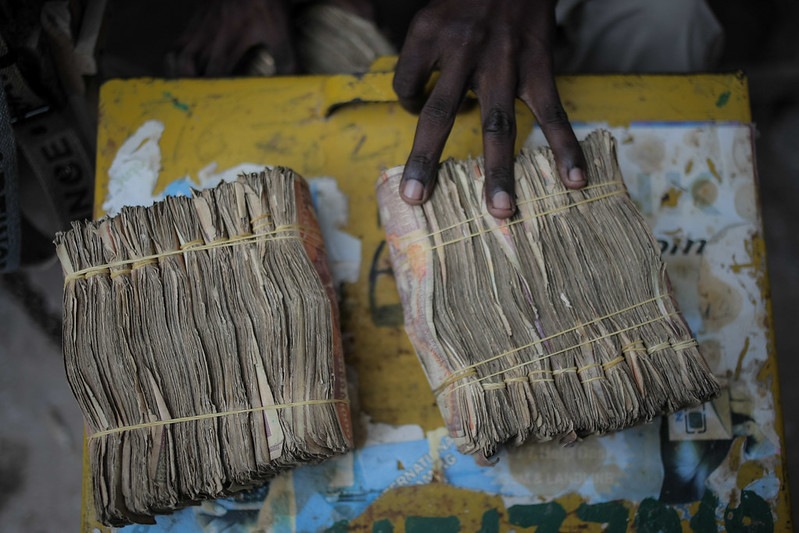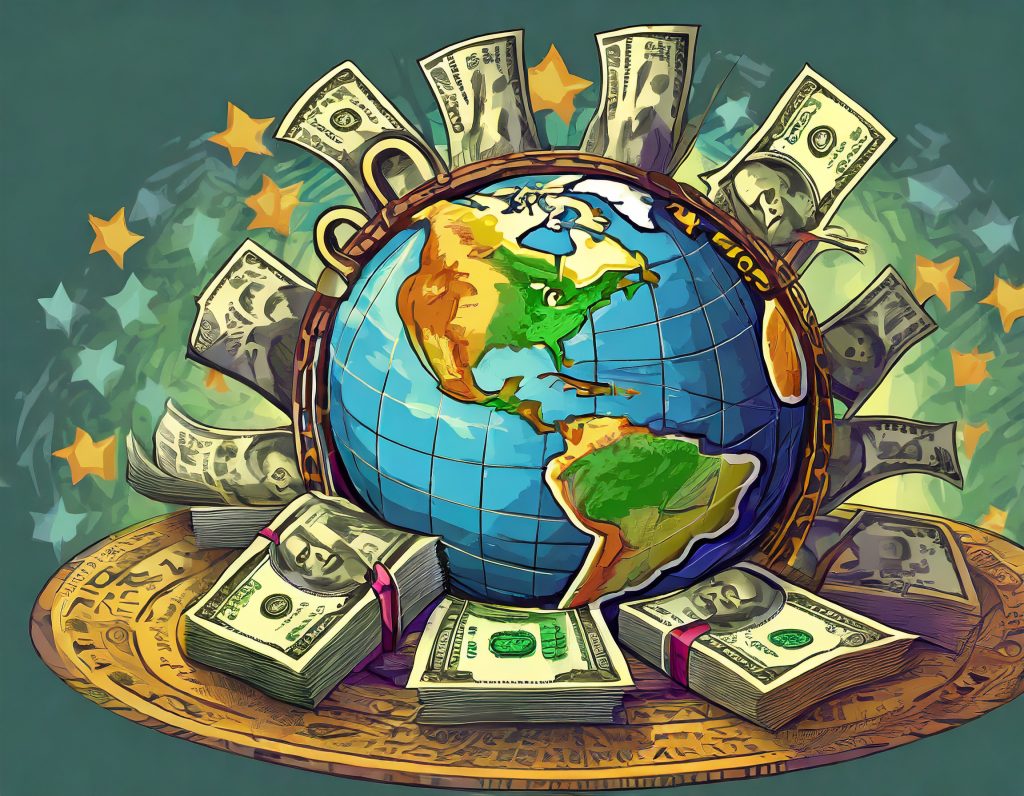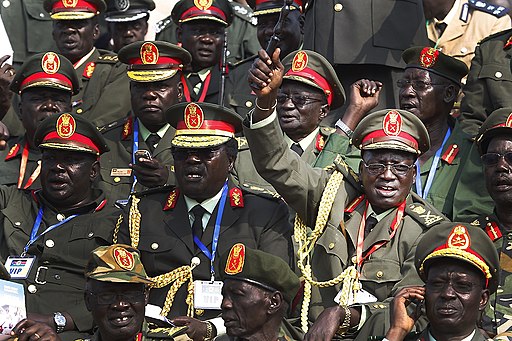Illicit financial flows (IFFs) in Africa (and indeed, elsewhere) are more than the corrupt syphoning of off poor countries’ wealth. They are a cycle of extraction and investment. There’s a reverse flow of political funds. Both flows are extraordinarily hard to measure.
IFFs have received a great deal of policy attention, and rightly so. In 2015, the High Level Panel on Illicit Financial Flows from Africa (created by UNECA) estimated that Africa loses more than $50 billion annually through IFFs – the flows of money which had been ‘illicitly earned, transferred, or utilized’. The majority of IFFs originate from commercial tax evasion, including through transfer pricing mechanisms. Smaller but significant amounts are criminal activities, including the trade in drugs and human beings, as well as the smuggling of arms and contraband; and bribery and theft by corrupt government officials. Despite the inclusive nature of the definition, almost all of the focus in the literature has been on financial outflows – that is, money which has left African economies and by extension, the purview of African exchequers. As a consequence, political analyses on IFFs in developing countries focus primarily on the development-constraining impacts of IFFs, the manner in which capital flight can lead to political instability, and the weakness of political institutions which allow IFFs.
This blog argues that broadening the lens to include inward flows of money is essential, especially in less-institutionalized country contexts whose economies are regionally integrated, and where politics may be highly monetized and transactional – i.e., what we refer to as ‘political markets’ (PMs). IFFs in the form of cash inflows can form an extremely important part of ‘political finance’ (PF) – discretionary funds available to a politician for the renting or buying of political services. The remainder of this blog sets out a preliminary and incomplete classification of financial flows as related to PF, and some methodological challenges which researchers are likely to encounter while trying to map these flows. The blog uses the Red Sea region as an example, where political finance moves primarily (and perhaps unsurprisingly) from the Gulf States and Turkey into the Horn of Africa.
There are (at least) two ways of thinking about cross-border financial inflows. The first is with reference to the intended objective for which the money is moving. This is unsatisfactory because financial flows which are unrelated to politics may have political impacts by transforming the broader political economy and may be used by the recipients of funds in unanticipated ways. This happened in Somalia in the 1970s when remittances combined with the franco valuta system fueled the rise of a trader class and an informal private sector, transforming politics.
The second method would be to classify financial flows based on whether they shape politics directly or indirectly. Put differently, we can classify financial flows based on how easily they can be diverted for political purposes.
Some of the most common types of direct transfers include actual cash payments from states to politicians and political parties, or for security co-operation, which can take the form of payments for salaries, training, or materiel. Needless to say, direct cash transfers to political leaders are the most sought after form of political finance, and the most difficult to count, unless they are identified by chance – as appeared to be the case for US$9.6 million being transported to Somalia in unmarked bags from the UAE. Security cooperation is also very difficult to quantify as states rarely report ‘hard numbers’ for these – and not all the money provided for security assistance can be deployed to purchase or rent political loyalties. In some cases, security assistance can help strengthen political elites’ coercive capabilities, and indirectly affect political market dynamics. Other forms of direct transfers can include payments made to leaders/groups in connection with the grant of licenses for extractive enterprises, land, and investments/conducting of business on preferential terms — although some of these payments are obviously used for personal enrichment.
Indirect transfers affect political financing by re-shaping the political economy of a country. The most obvious examples are remittances and transfers by diaspora groups, which can make the country’s political system less dependent on the distribution of largesse political elites in the form of patronage. This was certainly the case in Yemen, prior to the Iraq war, when Ali Abdullah Saleh was far from the most important source of funds in the political economy.
Another way of thinking about this is that indirect transfers affect the relative importance of existing sources of political finance. Another key example comes from the Islamist financial institutions which began operations in Sudan in 1977 (drawing resources from the GCC countries) and helped re-organize its economy and politics. As Edward Thomas argues:
The Islamic banks offered access to capital through a range of interest free financial instruments to people who never had access to capital before. Minibus drivers bought their own vehicles. Shopkeepers imported goods. Grain merchants allegedly bought grain supplies on credit and hoarded them as famine boosted their prices. Financiers made enormous profits, and new urban service industries eclipsed agriculture. All these new winners supported the Islamists.
Some inward flows fall in-between direct and indirect transfers. These include deposits in the central bank such as the one placed in the Ethiopian central bank by the UAE or in the Yemeni central bank by Saudi Arabia. Depending on the level of institutionalization of the central bank, some of these funds may be diverted for use in politics, or maintain the basic functioning of the economy – or both. Similarly loans and overseas developmental assistance may be diverted for political use, but not easily. It is more likely that they are used to finance developmental and infrastructural projects, creating opportunities for cronyism and patronage.
Arms deals are notoriously corrupt and are a favored vehicle for political payments. The 1999 South African arms deal included funds for the expenses of the African National Congress, reportedly to pay election expenses and provide payments in lieu of pensions for its retired veterans.
There are obvious methodological challenges faced by researchers who study political finance. The key point is that it is incredibly difficult to quantify these funds with any degree of accuracy, without crossing the line from research into intelligence collection. This is true even of relatively institutionalized flows such as debt or development assistance. For instance, none of the GCC countries or Turkey (as senders) report the amount of developmental assistance that they send to the HoA countries, and nor do the HoA countries report on these. A second challenge is that the implications of some monetary flows – especially those which transform the political economy — only become clearer over the medium to long term.
Earlier this year, as part of the PC-REP Program, we began to look into the patterns of financial flows from the GCC countries and Turkey into the HoA. Unfortunately, it has become clear that trying to quantify this is an impossible task, and would be elusive even with far greater research resources than we can bring to bear on the issue. What is possible to assess however, is whether the levels of political funding are increasing or decreasing, what types of political finance exist in a political system, their relative importance, and the actors who control these sources of finance. This provides some insight into the shifts in supply and demand in the regionalized political marketplace, contributing to an understanding of how elite configurations and political alliances are being reconfigured.
Aditya Sarkar is aPhD student at the Fletcher School at Tufts University, and an independent researcher. He has been a fellow at World Peace Foundation since 2017, and has advised the ILO and the Governments of Sudan, Somalia and Ethiopia on developing National Employment Policies, and has consulted with the World Bank, and the Open Society Foundations. Aditya is qualified as a lawyer in India and in England and Wales. He previously worked with Linklaters LLP global law firm in London as well as the Ministry of Commerce in India. He holds a master’s degree from the Fletcher School of Law and Diplomacy at Tufts University and is a graduate of the National Law School of India University in Bangalore, India. His research focuses on the political economy of transactional political systems, labour, and migration/displacement.
This article was produced as part of the Peace and Conflict Resolution Evidence Platform (PeaceRep), funded by UK Aid from the UK Foreign, Commonwealth & Development Office (FCDO) for the benefit of developing countries. PeaceRep is a seven-year research consortium led by the University of Edinburgh Law School.
Photo: Money exchanger displays Somali shilling notes on the streets of the Somali capital Mogadishu. AMISOM Public Information (Public domain)



